Stealing This From Twitter
stealing this from twitter

More Posts from Purposefullylackadaisical and Others
what do you think drives lady macbeth's cruelty and do you sympathise with her at all?
This post and this post might be of interest. But I think ‘cruelty’ is the wrong word. Cruelty implies violence for the sake of violence and enjoyment of violence. (See here.) Lady M doesn’t revel in the violence. She doesn’t delight in it the way some of the characters in, say, Titus Andronicus do, or even Margaret in Henry VI does after the murder of Rutland/during the murder of York. For Lady M violence is always a means to an end. “Infirm of purpose” is what she calls her husband when he starts to get faint-hearted. He’s too full of the milk of human kindness “to catch the nearest way.” For her, it’s all about the outcome. The ends justify the means. Like I said in one of those posts, I think her driving force is ambition. She wants more than what she has.
Interestingly, she never expresses any personal desire to be queen. She does, however, use the singular possessive pronoun ‘my’ when she says “The raven himself is hoarse / That croaks the fatal entrance of Duncan / Under my battlements.” She claims the crime as her own, and even though the idea of murder occurs to her and her husband independently, she is the criminal mastermind. She says, “you shall put / This night’s great business into my dispatch; / Which shall to all our nights and days to come / Give solely sovereign sway and masterdom.” And at the end of the scene: “Leave all the rest to me.” This regicide is her baby–and I use that word very deliberately. There are a million possible explanations for why Lady Macbeth is so desperate to seize this power for her husband. My guess is it has something to do with that baby she mentions in 1.7 which doesn’t appear in the play. A woman’s function at this point in history was basically to be a baby-making machine and ensure the survival of her husband’s line. She hasn’t been able to do that (for whatever reason) and her husband, at least, is already middle-aged, so that procreation window is rapidly closing, if it’s not closed already. By early modern standards, that’s a huge dynastic failure. My guess is that her power-grabbing is about agency and compensation. Maybe she can’t continue Macbeth’s line, but she can make him king. And she does.
But here’s the other part of it which I think is really important and often gets overlooked, and it goes back to the fact that Lady M never expresses a personal desire to be queen. She wants her husband to be king, and she thinks he is fully deserving of that office. “Thou wouldst be great;” she says, “Art not without ambition, but without / The illness should attend it.” AND THIS IS SO KEY. Because Lady M is nothing if not full of ambition. What she’s saying here is “You don’t have enough darkness in your soul to do this, so I’m going to do it for you.” Now. Is that somewhat fucked up? Absolutely. However, that is an enormous sacrifice to make. I’m not going to get into this in depth, but there’s a lot of natural law theory floating around in this play. What’s important to know is this: In the protestant ethos of this play, if you commit regicide, you are 100% going to be damned for eternity. There’s no doubt about that. So, in an insane backwards way, this is actually an incredibly loving, selfless thing to do on Lady M’s part. She is willing to sacrifice her own salvation to make her husband king. Let that sink in. That is so much more hardcore than just saying, “I’d take a bullet for you, babe.” She is willing to burn for all time to put him on the throne, and not only is she willing, but it’s her idea, not just something she does with her back against the wall. That is a crazy kind of love. And that’s one of my favorite things about this play. This is not a unanimous opinion by any means, but I firmly believe that even though the Macbeths are terrible tyrannical people, they are desperately, devotedly in love with one another. Their language is incredibly intimate. In his first letter Macbeth addresses his wife as “My dearest partner of greatness,” and throughout the play they are constantly struggling to help and heal one another. Theirs is a relationship built on love and equality, whatever else they do (and however their relationship is also sometimes toxic and fractures through the play). Look at Macbeth’s conversation with the doctor in 5.3 when his wife’s health begins to fail: “If thou couldst, doctor, cast / The water of my land, find her disease, / And purge it to a sound and pristine health, / I would applaud thee to the very echo, / That should applaud again.” That. Is. Love.
So. Why does Lady Macbeth do the terrible things she does? There’s no certain answer. Ambition has a lot to do with it. But I think that ambition is rooted in guilt about what she hasn’t been able to provide her husband with, and a passionate yearning to make up for that, somehow. Leo’s character says in Inception that positive emotion trumps negative emotion every time, and I think that’s true here. Lady M doesn’t orchestrate Duncan’s murder because she’s inherently cruel. She does it for love.
Love™️ cont.

— Devil in Spring by Lisa Kleypas
“I did love you. I even loved your hate and your hardness” —“Cat on a Hot Tin Roof” by Tennessee Williams

—“Poor Little Rich Boy” by Regina Spektor
“Kaling being a total boss lady seems to only make him love her more. An audience member asks if he is going to marry her, to which after only a slight pause he says, “I don’t know.”” —B.J. Novak about Mindy Kaling

“Then I realized that we all think we might be terrible people. But we only reveal this before we ask someone to love us. It is a kind of undressing.” —The First Bad Man by Miranda July

“But I love you. I want you to have your own thoughts and ideas and feelings, even when I hold you in my arms.” — A Room with a View by E.M. Forster
“She still loves him. This is the fact she wakes up to each morning. She checks it, sometimes, a tongue probing an aching tooth, making sure it still hurts.” —Salt Houses by Hala Alyan

—“State of Grace” by Taylor Swift
“I don’t write this letter to put bitterness into your heart, but to pluck it out of mine. For my own sake I must forgive you.” — De Profundis by Oscar Wilde

“My love for you is more/athletic than a verb,/agile as a star” — Sylvia Plath
“I think I see the difference now, between loving someone from afar and loving someone up close. When you see them up close, you see the real them, but they also get to see the real you. And Peter does. He sees me, and I see him.” ― To All the Boys I’ve Loved Before by Jenny Han


― Eleven Scandals to Start to Win a Duke’s Heart by Sarah MacLean
hi! i'm not sure if you already did this, but could you do a web weaving about the eldest daughter/ child (as a parental figure, taking care of younger siblings, etc.), but it doesn't have to be specifically about those things. thanks :)

@thisisalovestry (x)

Holly Warburton, Sisters

Maya Angelou, Mom & Me & Mom

Taylor Swift, tolerate it

Tabitha Suzama, Forbidden

@ch3r1b0mb (x)

Becks_Rylnn, How the Light Gets In




Supernatural (2005–2020), 1x18: Something Wicked

@thrill-of-first-lovee (x)

Daughter, Smother

Suzanne Collins, The Hunger Games

When Older Siblings Step Into Parents’ Shoes, NPR

Gillian Flynn, from Sharp Objects
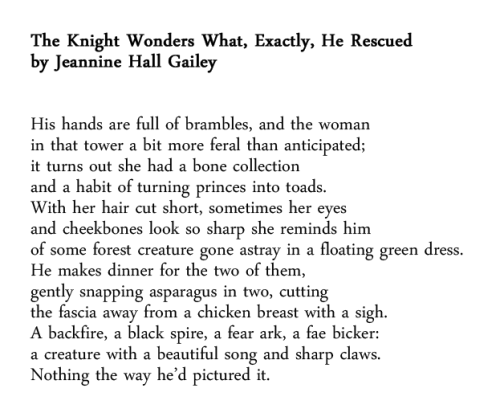
The Knight Wonders What, Exactly, He Rescued by Jeannine Hall Gailey
“Lily thought about Marilyn [Monroe]. Then she said, ‘It’s a funny thing about Marilyn. Nobody would be very happy if she were alive, except maybe me. You know how in the tabloids they’re always finding Elvis and JFK alive and living in South America or something? But they never find Marilyn, even though she’s just as famous. Well, they don’t find her, because they wouldn’t want to find her old.”
— Siri Hustvedt, The Enchantment of Lily Dahl
“This new focus on the more real, intimate side of girlhood has been largely rewarded by viewers and corporate partners alike. But what makes young women in particular so poised to take up this conversation, and ultimately profit from the interest of their (largely female) audience? For one, demonstrating high levels of personal and emotional intelligence is a prerequisite for being an idealized vision of a successful young woman. Many of these emerging trends in pop culture — yes, even in niche YouTube videos — indicate society’s intense interest in women developing a heightened awareness of the self. Feminist theory has long held that women practice self-surveillance (and therefore self-discipline) because of the immense pressures they face. From the expectation that girls know their specific body “type” (curvy on top! petite! pear-shaped!) to find the ideal jeans fit, to the myriad wellness and self-help circuits that focus on turning inward to find healing, to the health and diet fads that are rooted in self-diagnosis and self-treatment, girls and women are believed to find success through knowing and monitoring themselves intensely. The question is, if more and more gurus are turning inward, seemingly more interested in taking care of the self, then how do they continue to encourage other people to buy products that are largely focused on outward appearance? That’s where their established position as beauty experts comes into play. Buying products is one thing — but buying the right products signifies self-knowledge and the ability to care for oneself. Retail spending is blended with political and social freedom, something girls’ studies scholar Anita Harris calls a “linking of neoliberal ideologies about individual choice with a distorted kind of feminism.” Girls’ ability to make purchases is often seen as empowering, in its display of personal wealth amassed and its demonstration of knowing oneself best. The young women on YouTube have deftly manipulated this ethic to their advantage. There are only so many videos one can make about eyeshadow palettes or bubble bath before finding a new narrative through which to talk about them.”
— How YouTubers Like Zoella Capitalize On The Self-Care Movement (via thecrownedgoddess)
















Every time I wrote your name, I lied. Every time I wrote your name, it was the truth.
1.Clarice Lispector | 2.Nickie Zimov | 3.Warsan Shire | 4.Pablo Neruda | 5.Madeline Miller | 6.Nickie Zimov | 7.Madeline Miller | 8.Vincent van Gogh | 9.James Joyce | 10.Nick Lantz | 11.Ocean Vuong | 12.Nickie Zimov | 13.Richard Brautigan | 14.Keaton St. James
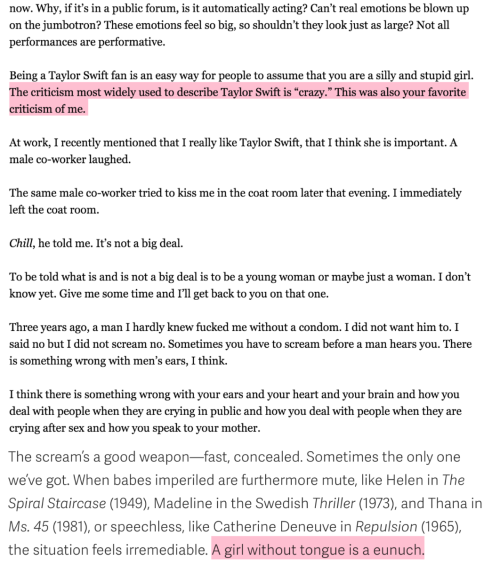
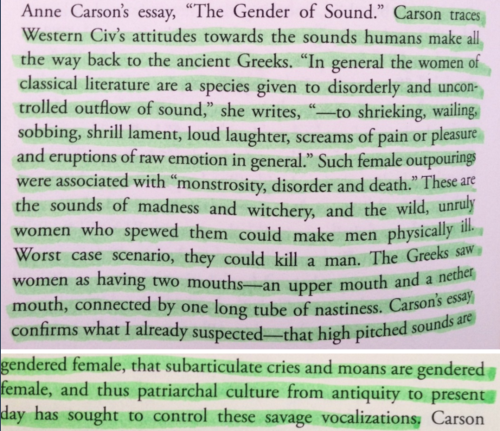
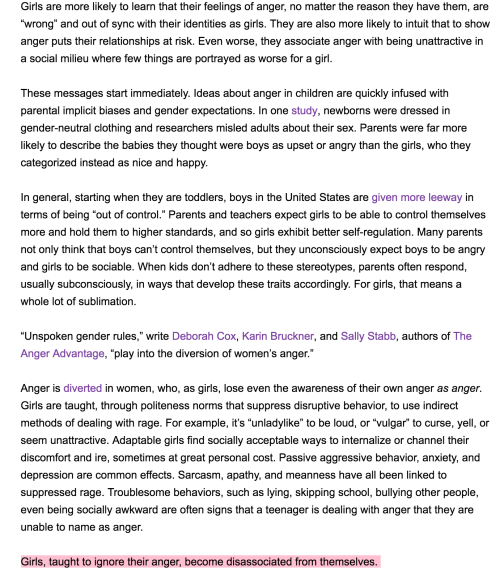


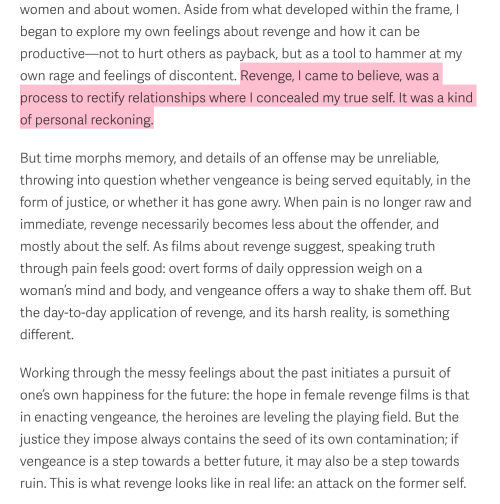
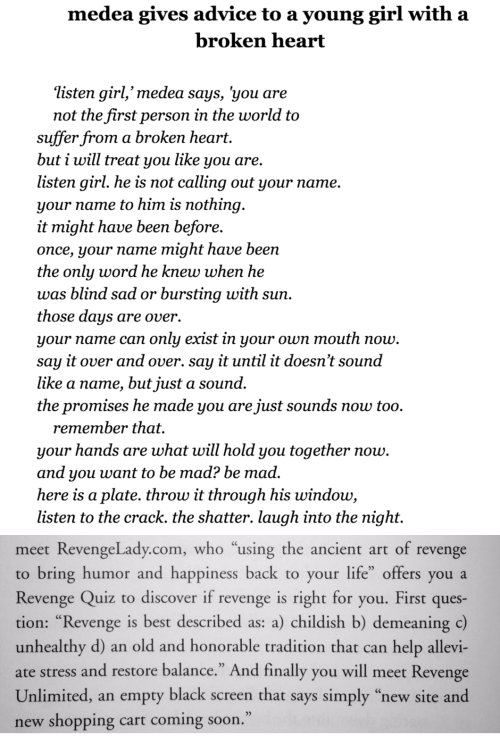
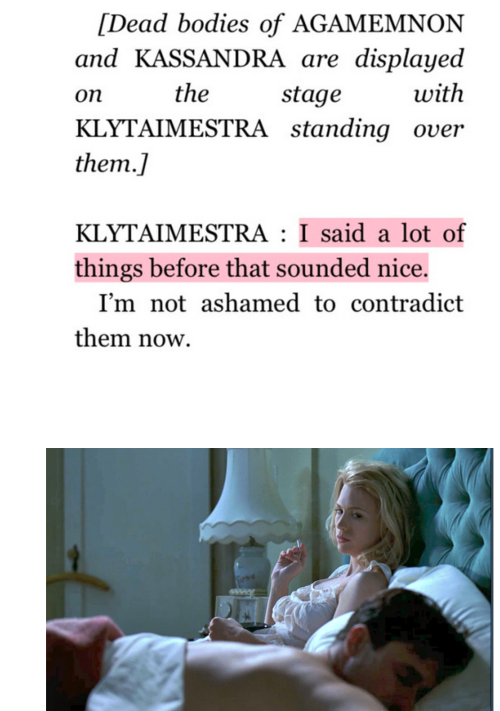
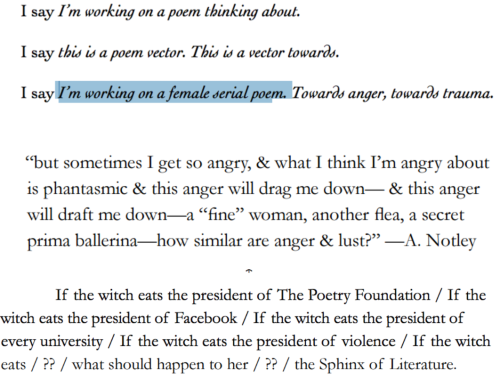
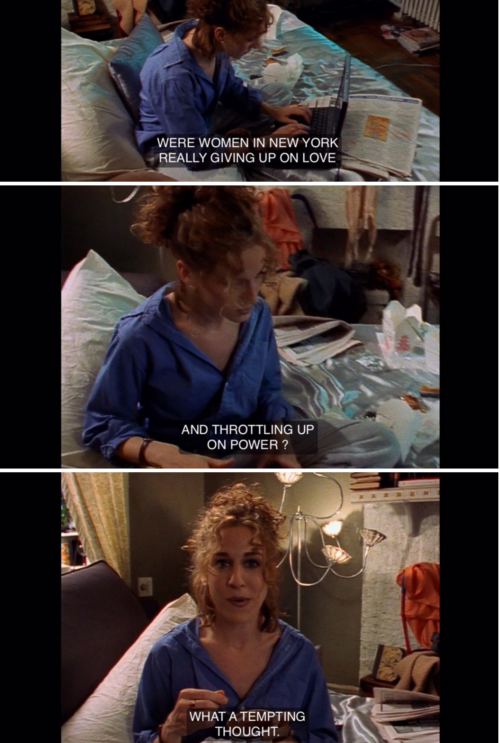
From the beginning: 1) from Michelle Lyn King’s Taylor Swift Youtube Videos 2) Sarah Nicole Prickett 3) from “Whistle While You Dixie” by Dodie Bellamy, When The Sick Rule The World4) From “Does Your Daughter Know It’s OK To Be Angry”? by Soraya Chemaly 5) a tumblr user paired this text with this dog image and I can’t refind it…if you see this, please let me know and also maybe where the agression text originated from? sry sry. 6) Dodie Bellamy 7) from Camila De Onis’s “Vengence Be Mine” 8) from Letters from Medea by Salma Deera 9) From Grief Lessons: Four Plays by Euripides by Anne Carson 10 )from Anne Carson’s translation of An Oresteia | Agamemnon by Aiskhylos 11) Mad Men still 12) from Helen or My Hunger by Gale Marie Thomson 13) Alice Notley, from Doctor Williams’ heiresses 14) From The Book of Repulsive Women by Carrie Lorig 15) Stills from Sex In the City
“call me medusa for my monstrosity is not mine to bear, but yours to fear.”
— a.c (via onceuponapenis)
-
 tleavemealone liked this · 4 months ago
tleavemealone liked this · 4 months ago -
 sharatheundead liked this · 10 months ago
sharatheundead liked this · 10 months ago -
 berna-di-angelo liked this · 10 months ago
berna-di-angelo liked this · 10 months ago -
 celestefem liked this · 10 months ago
celestefem liked this · 10 months ago -
 farishtaas reblogged this · 10 months ago
farishtaas reblogged this · 10 months ago -
 meep-is-here liked this · 1 year ago
meep-is-here liked this · 1 year ago -
 dollvein liked this · 1 year ago
dollvein liked this · 1 year ago -
 angelsick reblogged this · 1 year ago
angelsick reblogged this · 1 year ago -
 efumoancora liked this · 1 year ago
efumoancora liked this · 1 year ago -
 debutftv reblogged this · 1 year ago
debutftv reblogged this · 1 year ago -
 vanyabeam liked this · 1 year ago
vanyabeam liked this · 1 year ago -
 jackthe-lass reblogged this · 1 year ago
jackthe-lass reblogged this · 1 year ago -
 pppaper-planes liked this · 1 year ago
pppaper-planes liked this · 1 year ago -
 raspberriesanddietcoke liked this · 1 year ago
raspberriesanddietcoke liked this · 1 year ago -
 pineapple-under-the-sea liked this · 1 year ago
pineapple-under-the-sea liked this · 1 year ago -
 a-republican-mind liked this · 1 year ago
a-republican-mind liked this · 1 year ago -
 subtotem reblogged this · 1 year ago
subtotem reblogged this · 1 year ago -
 selkierosemary liked this · 1 year ago
selkierosemary liked this · 1 year ago -
 cowboy-times-in-outer-space liked this · 1 year ago
cowboy-times-in-outer-space liked this · 1 year ago -
 vivikitten liked this · 1 year ago
vivikitten liked this · 1 year ago -
 purposefullylackadaisical reblogged this · 1 year ago
purposefullylackadaisical reblogged this · 1 year ago -
 buffmeister reblogged this · 1 year ago
buffmeister reblogged this · 1 year ago -
 femmefranzkafka liked this · 1 year ago
femmefranzkafka liked this · 1 year ago -
 emofthewired liked this · 1 year ago
emofthewired liked this · 1 year ago -
 lovelnstereo liked this · 1 year ago
lovelnstereo liked this · 1 year ago -
 womenaremypriority liked this · 1 year ago
womenaremypriority liked this · 1 year ago -
 wonderswept liked this · 1 year ago
wonderswept liked this · 1 year ago -
 arrantfruit liked this · 1 year ago
arrantfruit liked this · 1 year ago -
 repvermoree liked this · 1 year ago
repvermoree liked this · 1 year ago -
 lactosefreeactually liked this · 2 years ago
lactosefreeactually liked this · 2 years ago -
 waitingroomphoebebridgers liked this · 2 years ago
waitingroomphoebebridgers liked this · 2 years ago -
 dandifiedstupefied liked this · 2 years ago
dandifiedstupefied liked this · 2 years ago -
 piscicultured reblogged this · 2 years ago
piscicultured reblogged this · 2 years ago -
 piscicultured liked this · 2 years ago
piscicultured liked this · 2 years ago -
 noidedgirl liked this · 2 years ago
noidedgirl liked this · 2 years ago -
 inuncampominato liked this · 2 years ago
inuncampominato liked this · 2 years ago -
 ireadaboutahero liked this · 2 years ago
ireadaboutahero liked this · 2 years ago -
 oldtestamentbrazilian liked this · 2 years ago
oldtestamentbrazilian liked this · 2 years ago -
 evecustosdelux liked this · 2 years ago
evecustosdelux liked this · 2 years ago -
 son-trava liked this · 2 years ago
son-trava liked this · 2 years ago
95 posts